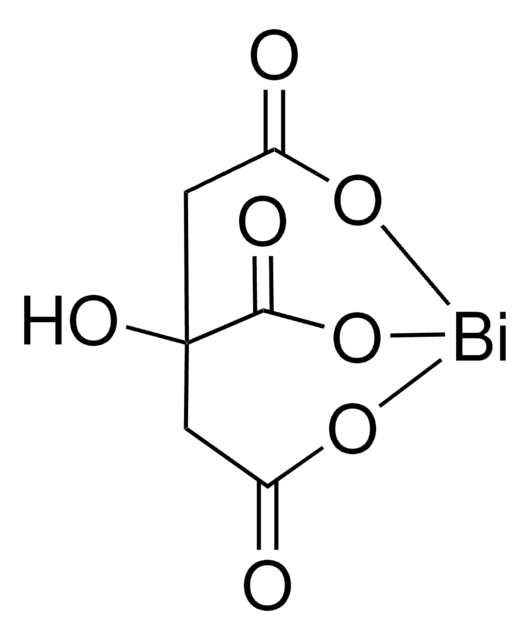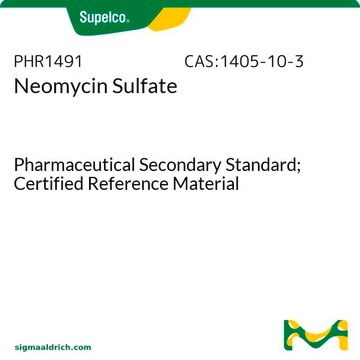480789
Bismuth(III) subsalicylate
99.9% trace metals basis
Synonym(s):
Bismuth oxysalicylate, Bismuth subsalicylate, Bismuth(III) salicylate basic
Sign Into View Organizational & Contract Pricing
All Photos(3)
About This Item
Linear Formula:
HOC6H4COOBiO
CAS Number:
Molecular Weight:
362.09
EC Number:
MDL number:
UNSPSC Code:
12161600
PubChem Substance ID:
NACRES:
NA.22
Recommended Products
Quality Level
Assay
99.9% trace metals basis
reaction suitability
core: bismuth
reagent type: catalyst
mp
>350 °C (lit.)
SMILES string
O[Bi]1OC(=O)c2ccccc2O1
InChI
1S/C7H6O3.Bi.H2O/c8-6-4-2-1-3-5(6)7(9)10;;/h1-4,8H,(H,9,10);;1H2/q;+3;/p-3
InChI key
ZREIPSZUJIFJNP-UHFFFAOYSA-K
General description
Bismuth(III) subsalicylate (BSS) is mainly used in bismuth-based medicines for treating gastrointestinal disorders and diarrhea.
Application
- Use of ferric chloride to identify salicylate-containing poisons.: This study explores the use of ferric chloride to detect salicylate compounds, including Bismuth subsalicylate, highlighting its significance in toxicological screenings and emergency treatments. (Hoffman RJ et al., 2002).
- Effect of pepper and bismuth subsalicylate on gastric pain and surface hydrophobicity in the rat.: Investigates the effects of Bismuth subsalicylate on gastric pain and stomach lining properties, providing insights into its gastroprotective mechanisms. (Lichtenberger LM et al., 1998).
- The coccoid forms of Helicobacter pylori. Criteria for their viability.: Examines the effectiveness of Bismuth subsalicylate in targeting different morphological forms of Helicobacter pylori, contributing to its role in eradication therapies. (Bode G et al., 1993).
- Bismuth therapy in gastrointestinal diseases.: A comprehensive review of the therapeutic applications of Bismuth subsalicylate in treating various gastrointestinal disorders, underscoring its pharmacological benefits and safety profile. (Gorbach SL, 1990).
Storage Class Code
11 - Combustible Solids
WGK
WGK 3
Flash Point(F)
Not applicable
Flash Point(C)
Not applicable
Personal Protective Equipment
dust mask type N95 (US), Eyeshields, Gloves
Choose from one of the most recent versions:
Already Own This Product?
Find documentation for the products that you have recently purchased in the Document Library.
Customers Also Viewed
Copolymerizations of e-Caprolactone and Glycolide A Comparison of Tin (II) Octanoate and Bismuth (III) Subsalicylate as Initiators.
Kricheldorf HR and Rost S.
Biomolecules, 6(3), 1345-1352 (2005)
M D Manhart
Reviews of infectious diseases, 12 Suppl 1, S11-S15 (1990-01-01)
This report demonstrates that bismuth subsalicylate (BSS) effectively inhibits growth of a number of bacterial strains known to cause diarrhea, including Escherichia coli, Salmonella, Shigella, and Campylobacter. Other bismuth salts and sodium salicylate, a hydrolysis product of BSS in the
D W Bierer
Reviews of infectious diseases, 12 Suppl 1, S3-S8 (1990-01-01)
Pepto-Bismol, which contains bismuth subsalicylate (BSS) as the active ingredient, has been marketed in the United States for more than 80 years. In the gastrointestinal tract, BSS is converted to salicylic acid and insoluble bismuth salts. The salicylate portion of
Rhoswen Lloyd et al.
Nursing standard (Royal College of Nursing (Great Britain) : 1987), 26(40), 51-56 (2012-08-02)
This article describes the prevention and treatment of travellers' diarrhoea, the leading cause of illness in people travelling abroad. The most common cause of travellers' diarrhoea worldwide is bacterial pathogens, which account for up to 80% of cases. Exercising caution
N Chande et al.
The Cochrane database of systematic reviews, (2)(2), CD006096-CD006096 (2008-04-22)
Lymphocytic colitis is a cause of chronic diarrhea. Therapy is based mainly on case series and uncontrolled trials, or by extrapolation of data for treating collagenous colitis, a related disorder. This review was performed to identify therapies for lymphocytic colitis
Our team of scientists has experience in all areas of research including Life Science, Material Science, Chemical Synthesis, Chromatography, Analytical and many others.
Contact Technical Service










